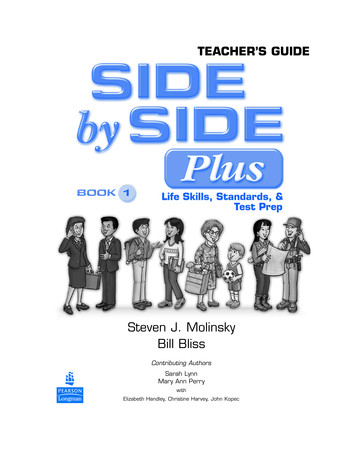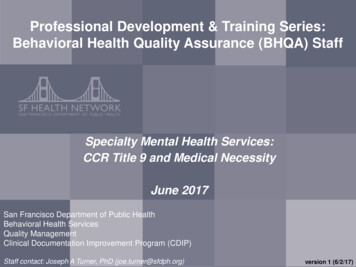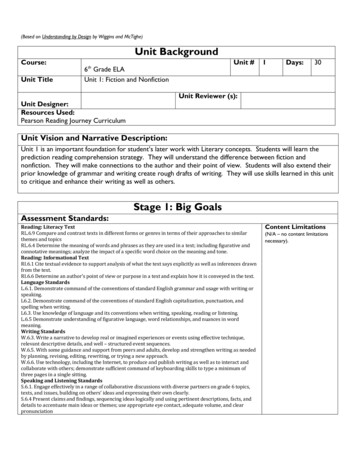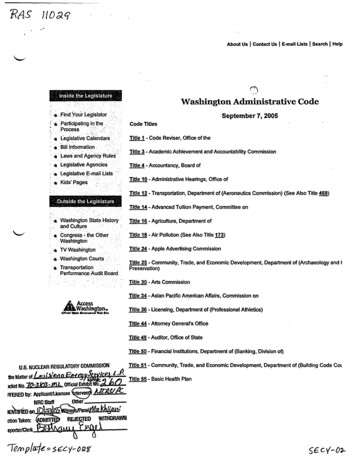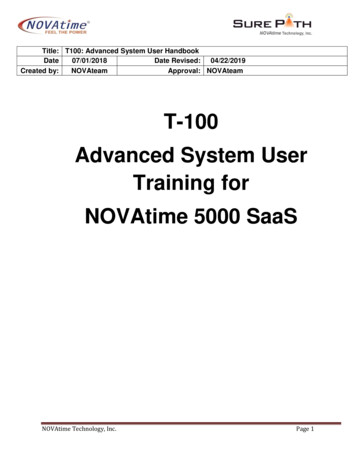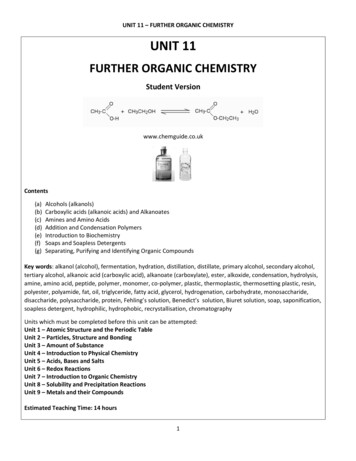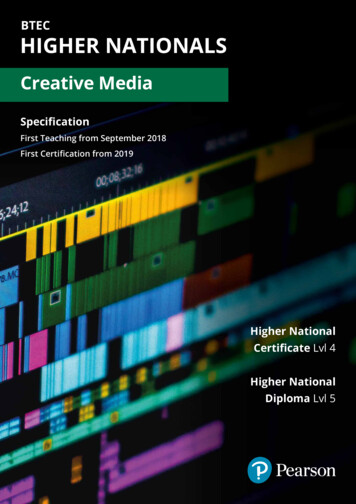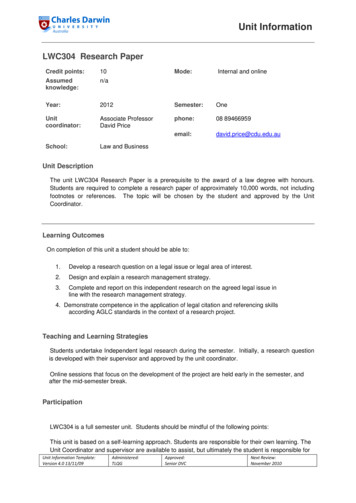
Transcription
Unit InformationLWC304 Research PaperCredit School:Mode:Internal and online2012Semester:OneAssociate ProfessorDavid Pricephone:08 89466959email:david.price@cdu.edu.auLaw and BusinessUnit DescriptionThe unit LWC304 Research Paper is a prerequisite to the award of a law degree with honours.Students are required to complete a research paper of approximately 10,000 words, not includingfootnotes or references. The topic will be chosen by the student and approved by the UnitCoordinator.Learning OutcomesOn completion of this unit a student should be able to:1.Develop a research question on a legal issue or legal area of interest.2.Design and explain a research management strategy.3.Complete and report on this independent research on the agreed legal issue inline with the research management strategy.4. Demonstrate competence in the application of legal citation and referencing skillsaccording AGLC standards in the context of a research project.Teaching and Learning StrategiesStudents undertake Independent legal research during the semester. Initially, a research questionis developed with their supervisor and approved by the unit coordinator.Online sessions that focus on the development of the project are held early in the semester, andafter the mid-semester break.ParticipationLWC304 is a full semester unit. Students should be mindful of the following points:This unit is based on a self-learning approach. Students are responsible for their own learning. TheUnit Coordinator and supervisor are available to assist, but ultimately the student is responsible forUnit Information Template:Version 4.0 13/11/09Administered:TLQGApproved:Senior DVCNext Review:November 2010
2obtaining mastery of this unit. Students who succeed are those who are self-starters and make bestuse of the resources available to them and are prepared to ask questions to seek out theinformation they need.Students are also responsible for identifying a supervisor from amongst the academic staff in thediscipline or an associate supervisor who may be a member of the legal profession. The UnitCoordinator will act as default supervisor where students are unable to identify an internalsupervisor or where they wish to use an associate supervisor.Specific details of individual seminar times can be obtained by accessing the class timetable at:http://skua.cdu.edu.au/swseven/Special Admission RequirementsAdmission to this unit requires the approval of the Head of the Law discipline or delegate.Prospective students should have a grade point average of 5.2.ResourcesRequired textbook(s)There is no set text for this unit.rdHowever students will need to utilise the Australian Guide to Legal Citation (3 ed., 2010).Suggested Reading:thBruce Bott & Ruth Talbot, Nemes and Coss’ Effective Legal Research, LexisNexis, 4 ed., 2010.The AGLC and suggested books can be ordered from the CDU Bookshop through their website atwww.cdu.edu.au/bookshopLearnline (Online Learning System)Learnline is Charles Darwin University’s on-line learning system.In this unit, Learnline will be used to: provide important announcements about the unit distribute relevant material run scheduled online seminars provide a communication point where you contribute to discussions as part of yourresearch, and to interact with other students in the unitYou will need to connect to the Internet to access it, at http://learnline.cdu.edu.au/e-Reservee-Reserve allows electronic copies of journal articles, book chapters and lecturer notes that havebeen recommended by a lecturer as part of their course reading requirements. You can access eReserve at http://ereserve.cdu.edu.au.ezproxy.cdu.edu.au/
3This site is password protected. Your CDU student login will provide you access. You can thensearch for items by Lecturer, Unit Code, Title, Author, keyword, Year or Date if you have thatinformation.Overview of AssessmentItemDescription/Focus1.Summative Assessment for this unit comprises evaluationof a final research paper of some 10,000 words (notincluding footnotes or bibliography).2.Formative feedback is provided to individual studentsthrough discussions with their supervisorsValue100%Relates tolearningoutcomes1, 2, 3, 4,n/aLearnline SubmissionThe research paper should be submitted on or before 11:59pm CST, 3 June 2012 via the OnlineSubmission provision in the Assessments area of the Learnline site.If submission by Learnline is technically impossible, or if unsurmountable difficulties are encountered,contact the unit coordinator at david.price@cdu.edu.auTo submit via Learnline:Click on the Assessments button on the left-hand side of the screen then click the ResearchPaper link.On the ‘Assignment Materials’ section, click on Browse for Local File to attach your file. Oncethe file has been located, click Open and the file name will appear in the Selected File section.Click on Attach File.You may now click on ‘Submit’ (or ‘Save as Draft’ if you wish to come back to it at a later stage).Only click ‘Submit’ once you are certain the research paper is complete.Warning: Once your research paper is submitted you cannot go back and make changes to it.Therefore if you are not ready for your supervisor to review your assignment use the ‘Save as Draft’button.If you make a mistake (i.e. submit the wrong essay), you will need to email your lecturer to advise.Again, ensure that the cover sheet is attached, and that your name appears in a header or footer inthe assignment.Extensions and late submissionThe research paper must be submitted by the due date unless a PRIOR extension of time has beenapproved by the Unit Coordinator before the due date. The request for an extension of time will onlybe considered for reasons properly supported by written documents. (The written documents mustprovide sufficient reasons why the assignment cannot be completed over the period given for theassignment).
4Students who submit the research paper after the due date without prior approval from the UnitCoordinator will incur a penalty in accordance with the Faculty policy on late submission.Calculation of HonoursFor the purpose of calculating honours, the research paper has a weighting of x 4; that is, it istreated as equivalent to a 40 credit point unit for that purpose [where a student completes morethan one research paper, the first only is so weighted for honours purposes].A degree with honours is awarded on the following basis:First class:Grade Point Average [GPA]Second Class Division A:Second Class Division B:6.0GPAGPA5.55.2For the purpose of calculating GPA for honours, there is no rounding up of numbers. For example,a GPA of 5.499 gives an entitlement to 2B honours only.Honours may be calculated by dividing the number of graded law units by the total grade pointsreceived. Points are calculated as follows:High DistinctionDistinctionCreditPassPC or PSFail765432A hypothetical example is given below. Note that the example is based on a 3 year graduate entrydegree program and assumes that the student has taken 2 of the former skills units, which, beingungraded passes, are not included for the purpose of calculating honours. The units taken and thedivisor [in the example, 24], will vary according to the nature of the degree [graduate,undergraduate, or combined] and the number of non-law electives or former skills units taken.Only law degree units are included in the honours calculation. The common units undertaken inthe 4 year BLaws degree program, and any non-law units, are not included.Students should consult with the unit coordinator if they have difficulty in assessing their eligibilityfor honours.Example: Calculation of Law HonoursThis example is based on the 3 year graduate entry degree and assumes that the student hastaken 2 of the former 5 credit-point skills units. Since ungraded passes only were awarded, theseunits are not included for the purpose of calculating honours.Except for the former LWZ001 and LWC304, all units have a 10 credit point value and, therefore,have a 1 x weighting. LWZ001, having been a 20 credit point unit, has a 2 x weighting. TheResearch paper, though a 10 credit point unit, has a 4 x weighting for honours purposes.Note that this example includes units offered under both former codes and current codes. Thechange of code makes no difference in calculating honours.Note also that the former 5 credit point law skills units, for which an ungraded pass (PU) was theonly grade awarded, are not included in the honours calculations. From 2010, the new law skillsunits became 10 credit point units subject to the normal full range of grades and are thereforeincluded in honours grade calculations.
5UnitGrade ReceivedGrade weightingScoreLWZ001C210 (2 X C15LWZ013C15LWZ214D16LWZ315C15Law ElectiveP14LWS010 Moot (5cps)PU--LWS017 ClientInterviewing (5cps)PU--non-Law electiveHD--LWZ316C15LWZ317D16LWZ320 ProfessionalResponsibilityP14LWC304HD428 (4 X 7)24134TOTAL134 divided by 24 5.583 honours GPATherefore, the hypothetical student, having a GPA of 5.583, would be awarded Honours 2A.In relation to the significance of the weighting of the honours paper, in the above example thestudent received HD for that unit. However, if the student had received:a D (distinction) for the research paper, the GPA would be 5.41, giving 2B honours;a C (credit) for the research paper, the GPA would be 5.25, also giving 2B honours;a P (pass) for the research paper, the GPA would be 5.08 and the degree would beawarded without honours.CDU Graduate attributes
6CDU graduate attributes refer to those skills, qualities and understandings that should be acquired bystudents during their time at the University regardless of their discipline of study. attributes.html).In this unit, the following graduate attributes are isitionCan identify, retrieve, evaluate and use relevant information andcurrent technologies to advance learning and execute work tasks.12, 4ApplicationIs an efficient and innovative project planner and problem solver,capable of applying logical and critical thinking to problems acrossa range of disciplinary settings and has self-management skillsthat contribute to personal satisfaction and growth.CreativityCan conceive of imaginative and innovative responses to futureorientated challenges and research.2, 3KnowledgebaseHas an understanding of the broad theoretical and technicalconcepts related to their discipline area, with relevant connectionsto industry, professional, and regional and indigenous knowledge.1, 2Demonstrates oral, written, and effective listening skills as well asnumerical, technical and graphic communication skills in a crossgenerational environment.3, 4CommunicationSocialresponsibilityIs able to apply equity values, and has a sense of socialresponsibility, sustainability, and sensitivity to other peoples,cultures and the environment.2, 3FlexibilityCan function effectively and constructively in an inter-cultural orglobal environment and in a variety of complex situations.2, 3University Plagiarism policyPlagiarism is the unacknowledged use of material written or produced by others or a rework of yourown material. All sources of information and ideas used in assignments must be referenced. Thisapplies whether the information is from a book, journal article, the internet, or a previous essay youwrote or the assignment of a friend.Plagiarism or other acts of academic dishonesty if proved may have very seriousconsequences for those wishing to be admitted to practise as a legal practitioner, as provendishonesty may lead to refusal of admission by the relevant Legal Practitioners AdmissionBoard.The University Plagiarism policy is available cademicandscientificmisconduct.pdf
School: Law and Business Unit Description The unit LWC304 Research Paper is a prerequisite to the award of a law degree with honours. Students are required to complete a research paper of approximately 10,000 words, not including footnotes or references. The topic will be chosen by the student and approved by the Unit Coordinator. Learning Outcomes On completion of this unit a student should .
